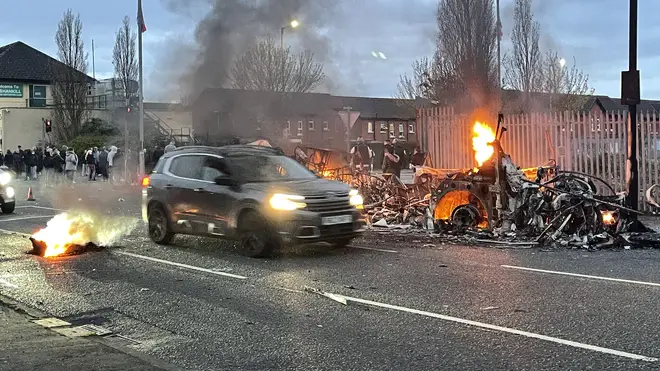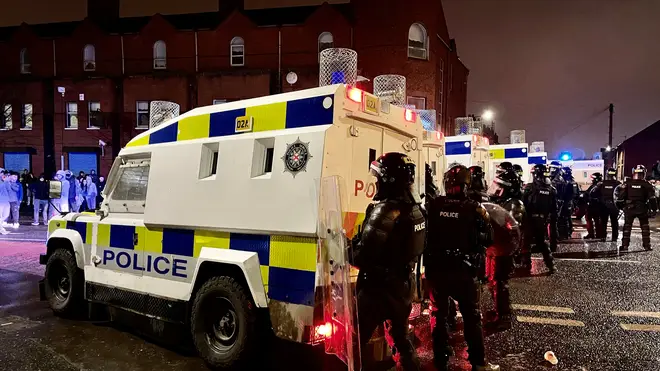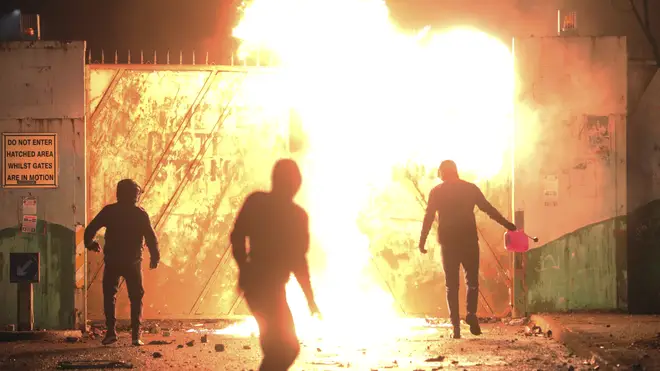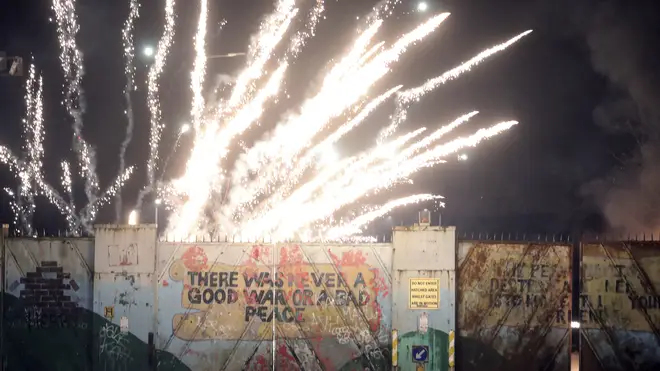
Richard Spurr 1am - 4am
8 April 2021, 16:38 | Updated: 8 April 2021, 21:33

Riots and clashes in Northern Ireland have laid bare the rising tension and anger in the country's communities.
Dozens of officers have been injured as dramatic images of flaming vehicles and confrontations with riot police have emerged.
Police Service of Northern Ireland (PSNI) Assistant Chief Constable Jonathan Roberts said the scale of the disorder has not been seen for several years – but what has driven the violence and where does Northern Ireland go from here?
Rioting has erupted in Belfast, Derry, Newtownabbey, Carrickfergus and Ballymena, much of it in loyalist working class areas, some in the grip of paramilitary gangs.
Disorder has also broken out in republican areas in recent days.
Children as young as 12 have reportedly been taking part in the disruptions.
Read more: Angry caller tears into Brexit amid disturbances in Northern Ireland
Read more: LBC listeners branded this call on Northern Ireland 'brilliant' and 'insightful'

Political commentator explains the situation in Northern Ireland
On Wednesday night, youths on both sides of a West Belfast peace line threw petrol bombs and missiles at each other.
A bus, which did not have passengers on board, was hijacked and set on fire. The driver is unhurt but shaken.
A press photographer was also attacked.
ACC Roberts said 55 police officers have been injured across the several nights of disorder.
Three factors have been referred to by prominent politicians and commentators in recent days – a controversial funeral, Brexit and paramilitary groups.
Unionists are furious that prosecutors will not take action against 24 Sinn Fein politicians, including deputy First Minister Michelle O'Neill, for attending the funeral of IRA leader Bobby Storey last year.
That decision was taken partially because police engaged with organisers before the event, which drew 2,000 people to the streets amid the pandemic.
Read more: 'The United Kingdom is under mortal threat': James O'Brien's powerful reaction to NI violence


All four main unionist parties have called on PSNI Chief Constable Simon Byrne to quit, but he has refused to do so and said he wants to engage with people about their concerns.
The unrest has also been sparked by ongoing grievances about the trade border in the Irish Sea caused by the Brexit deal.
Non-unionist parties have accused the First Minister, Arlene Forster, and other leaders of stoking up tensions over the trade issue, but she has said they are merely reflecting a genuine desire to do away with the Northern Ireland protocol.
Paramilitary elements are thought to be behind much of the disorder, either directly or through orchestrating young people, though police have yet to confirm this.
The PSNI also believes that paramilitary involvement in Newtownabbey and Carrickfergus is more to do with a rogue faction, the South East Antrim UDA, reacting to police operations against it, rather than the funeral or Brexit.
Read more: Northern Ireland was used as Brexit bargaining chip, commentator warns

The Stormont Assembly was recalled from Easter recess for an emergency sitting on Thursday to debate the violence, which has mostly flared in loyalist areas.
Boris Johnson, who was urged by Labour leader Keir Starmer to "step up" and convene all-party talks, tweeted: "I am deeply concerned by the scenes of violence in Northern Ireland, especially attacks on PSNI who are protecting the public and businesses, attacks on a bus driver and the assault of a journalist.
"The way to resolve differences is through dialogue, not violence or criminality."
The Stormont Assembly was recalled from its Easter break to debate the violence, while the Northern Ireland Executive – made up of unionist, republican and the Alliance party politicians, said it was "gravely concerned" by the disorder.

Keir Starmer urges PM to 'step up' on Northern Ireland
In a statement, the Executive said: "Attacks on police officers, public services and communities are deplorable and they must stop.
"Destruction, violence and the threat of violence are completely unacceptable and unjustifiable, no matter what concerns may exist in communities.
"Those who would seek to use and abuse our children and young people to carry out these attacks have no place in our society."